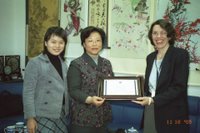
[For Kathy's earlier career development notes, please see December 16, November 28 and November 18]
This is my final report on the fifth and last session examining career development initiatives in China. Delegates had the opportunity to visit the
Shanghai Community Service Center For Employment.
This Center, which is administered under the Social Security Department of the Ministry of Labor, provides guidance for re-employment to middle aged laid-off personnel. Ms. Ding Xueyuan, Assistant Director of the Center, provided an overview of the community and the Center's history.
The Community Aid Center resides in a community of over 95,000 citizens (approximately 30,000 families). Besides the Center, the community supports 8 kindergarten schools; 6 elementary schools; 6 middle schools; 2 technical schools; a university (
East China Normal University) and, 2 community hospitals with over 1,000 beds.
The Community Aid Center in Shanghai has four floors, which includes a computer room; ping-pong room;diningg room, even a small theater. The community center supports a retired nursing home with 300 residents, ages 70 - 104 years, and a Senior Citizen University as well, covering many subjects. They also have a bowling alley, and skating rink. One room, for example, had many gorgeous scrolls adoring the walls of the center that were painted by local citizens, which were for sale, as were many delightful items, handmade by local citizens. The sales from these items help to support Center activities. Our delegation was more than pleased to "shop" at the end of our visit.

Ms. Xueyuan stated that every community in Shanghai has a community center like this one --it is a national policy. (see notes at end of article for more information)
Ms. Xueyuan says that the Community Center is a very popular place and used by area residents throughout the year. She said that most of the visitors are citizens who are retired or laid-off looking for re-employment opportunities.
Ms. Xueyuan stated that in order to receive services from this Center however, individuals must be permanent residents of the community. Ms. Xueyuan mentioned that all community centers are assisted by municipal government and foundations, which include the Shanghai Charity Foundation and the Shanghai Poverty-Relief Foundation, and are examples of two types of foundations in Shanghai - "Shanghai has established more than 100 types of foundations and more than 260 poverty-relief centers [such as the Community Aid Center] with funds exceeding 100 million yuan (US $12.08 million)." (
Shanghai Government Takes Lead in Poverty Aid; China.org.cn; Jan. 2002)
The services found at this center are numerous. For instance, if the citizen does not have enough money to live on, they can visit the Center for help with clothing and food. Ms. Xueyuan said that the center staff will also provide further assistance towards retraining new employment by providing professional analysis, suggestions and solutions for the unemployed. In this regard, staff can help those looking for new jobs by practicing interviewing skills, with professional clothing for the interview, and referrals to training programs.
The types of jobs that citizens may be referred to primarily fall in the service area such as: guard; gardener; maintenance; cooking; home cleaning. Funds are provided by the government to assist laid-off workers to receive the training they need. The individual must pass an examination to demonstrate proficiency in the given skill, however, in order to get hired.
Ms. Xueyuan stated that even with these services, for those persons retired, it is not easy to find new employment. Highly trained college educated workers on the other hand, will find it easier
after obligatory retirement (age 50 for women; 60 for men) to return to work simply by returning to their last place of employment. Employers often hire such workers back because of their skills and experience. These workers continue to receive their government pensions as well.
The government supports laid-off workers to start their own small businesses, such as small retail, small electronics, repairs shops, and food outlets. To support such efforts the government offers start-up loans, tax free, for 3 years. Depending on how many employees are hired by the new enterprise, the owner can receive no interest or very little interest on the payback as well.
In 2001 over 10,000 community stores, restaurants and small enterprises have been set up in Shanghai, offering jobs to some 140,000 laid-off workers from state-owned enterprises http://www.china.org.cn/ is the authorized government portal site to China. www.china.org.cn is published under the auspices of the China International Publishing Group and the State Council Information Office in Beijing.
You might want to check out an interesting article in
U.S. News and World Report as well, written by Richard J. Newman
(June 20, 2005). In this article Mr. Newman discusses the impact two decades of government reform have made for the Chinese worker and for the world economy.
Our trip to China was an unforgettable pleasure. All the delegates agreed that our professional hosts were so gracious, informative and contacts we hope to stay in touch with for the future. The economic reforms in China will continue to make an impact on the types of careers and
jobs available for the Chinese worker. It will be exciting to watch how these changes impact Chinese
work values, wages and
career development initiatives for Chinese citizens of the 21st century.
Kathleen



